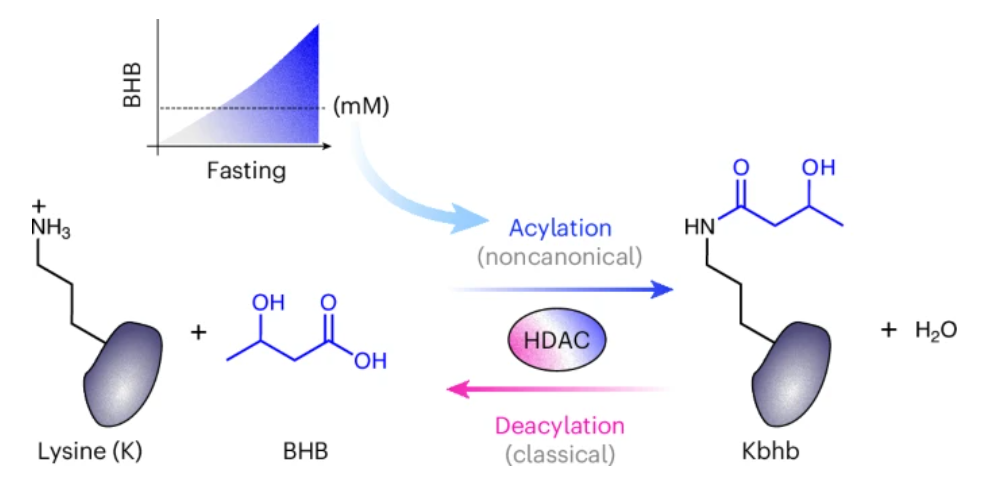β-Hydroxybutyrylation Analysis Service
β-Hydroxybutyrylation is a distinctive post-translational modification that reflects the close interplay between metabolic state and protein regulation. MtoZ Biolabs offers a specialized β-Hydroxybutyrylation Analysis Service designed to capture these dynamic molecular signatures with precision. Our service is tailored to meet the needs of both targeted analysis of specific proteins and large-scale proteomic profiling, providing comprehensive insights into this modification’s biological roles.
1. Targeted Protein β-Hydroxybutyrylation Analysis
For researchers focused on specific proteins, MtoZ Biolabs offers a targeted β-Hydroxybutyrylation analysis service. This approach enables the precise identification and quantification of β-hydroxybutyrylation sites on individual protein targets. By using selective enrichment strategies and high-resolution LC-MS/MS, we deliver detailed data on how this modification affects the target protein’s function under various conditions, allowing for focused insights into specific biological processes.
2. β-Hydroxybutyrylation Proteomics
For a broader, proteome-wide view, MtoZ Biolabs provides β-Hydroxybutyrylation proteomics analysis. This service integrates large-scale proteomics with advanced computational bioinformatics to systematically identify and quantify β-hydroxybutyrylation sites across the entire proteome. Researchers can track relative changes in this modification under different experimental conditions, enabling the exploration of its impact on metabolic pathways and cellular functions. This holistic approach offers a comprehensive understanding of how β-hydroxybutyrylation shapes biological processes at the systems level.
What Is β-Hydroxybutyrylation?
Lysine β-hydroxybutyrylation (Kbhb) installs a β-hydroxybutyryl group on lysine using β-hydroxybutyryl-CoA as the acyl donor, converting the ε-ammonium to a neutral amide and adding a hydroxyl-bearing acyl side chain. This changes electrostatics, steric bulk, and hydrogen-bonding capacity, which can modulate protein–protein or protein–DNA interactions and downstream functions. This acylation was first characterized on histones, where it functioned as an epigenetic marker linked to active transcription, particularly during fasting and ketogenic conditions.
Cellular β-hydroxybutyryl-CoA derives from ketone-body and short-chain fatty-acid metabolism, especially during conditions of nutrient deprivation, prolonged exercise, or ketogenic diet. This modification thus directly reflects shifts in metabolic status and energy utilization. Recent studies have revealed β-hydroxybutyrylation not only on histones but also on non-histone proteins, suggesting broader roles in metabolism, stress responses, and cellular signaling. Dysregulation of β-hydroxybutyrylation has been associated with altered chromatin remodeling, metabolic diseases, and cancer.

Tsusaka, T. et al. Nat Chem Biol. 2025.
Analysis Workflow

Sample Submission Suggestions
1. Sample Types
We accept various biological sample types, including but not limited to:
-
Cultured cells
-
Animal or human tissue
-
Plant tissue
-
Biological fluids such as plasma or serum
2. Storage and Transport
Samples should be snap-frozen in liquid nitrogen and stored at –80°C until shipment. Ship samples on dry ice. Avoid repeated freeze-thaw cycles.
Clients are encouraged to contact MtoZ Biolabs prior to submission for tailored sample preparation advice.
Service Advantages
✔️Advanced Analytical Platforms
MtoZ Biolabs established an advanced protein post-translational modifications analysis platform, guaranteeing reliable, fast, and highly accurate β-hydroxybutyrylation analysis service.
✔️Experienced Technical Team
Our scientists bring extensive expertise in proteomics and PTM research, ensuring rigorous experimental design and execution.
✔️Customizable Solutions
Flexible project scopes range from exploratory discovery studies to hypothesis-driven targeted validation.
✔️Reliable Data Delivery
All projects follow stringent quality control measures, ensuring reproducible, publication-ready results.
✔️One-Time-Charge
Our pricing is transparent, no hidden fees or additional costs.
Applications
1. DNA Damage Repair
β-Hydroxybutyrylation has been implicated in the recruitment and function of repair proteins, with relevance to radiotherapy, chemotherapy, and environmental stress models. Its role in genome stability makes it a promising target in both clinical and ecological studies.
2. Crosstalk with Other Modifications
Key regulatory enzymes involved in acetylation, ubiquitination, SUMOylation, and other modifications can themselves undergo β-hydroxybutyrylation. This crosstalk highlights an additional regulatory layer that coordinates diverse signaling networks.
3. Cancer Research
β-hydroxybutyrylation contributes to chromatin remodeling and transcriptional control. Evidence shows that it can regulate tumor suppressor proteins and signaling cascades, underscoring its importance in oncogenesis and cancer therapy.
4. Energy Metabolism
β-Hydroxybutyrylated proteins are enriched in core metabolic pathways, including carbohydrate, lipid, amino acid, and redox metabolism. Their abundance shifts under conditions such as fasting or nutrient deprivation, making this modification a useful marker in studies of metabolic disorders.
Deliverables
1. Comprehensive Experimental Details
2. Materials, Instruments, and Methods
3. The Detailed Information of β-Hydroxybutyrylation Analysis
4. Mass Spectrometry Image
5. Bioinformatics Analysis
6. Raw Data
With advanced analytical platforms and expert data interpretation, MtoZ Biolabs' β-Hydroxybutyrylation Analysis Service delivers reliable, high-resolution insights into this modification. Free project evaluation, welcome to learn more details!







